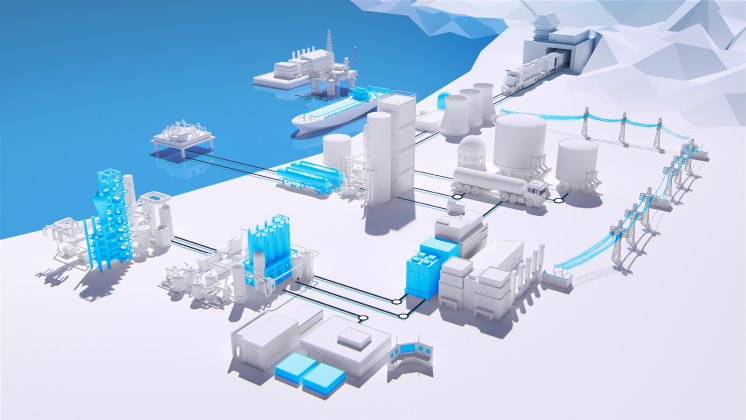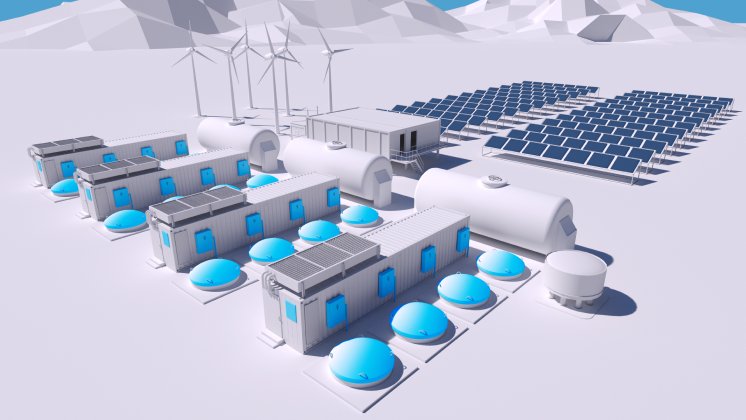- Cooperation platform Engineering Base provides foundation for cooperative engineering
- Change management creates maximum transparency, minimizes errors and enhances quality of data and documentation
- Data centricity and modularization are key for hydrogen plants
- Standardized information models ensure quality of plant data in Engineering Base
Aucotec sets out to address these challenges and is showcasing its solutions for the international process industry at ACHEMA (June 10 – 14 in Frankfurt). Visitors can find the company’s booths in the Engineering section, at the special Hydrogen show and in the Digital Hub. Taking center stage: the Engineering Base cooperation platform.
Data is the driving force of the process industry
With Engineering Base Aucotec will demonstrate how plants and the various engineering disciplines can be connected with one another efficiently and work together to optimum effect. After all, plants, machines and components are becoming more and more autonomous and modular in design. At the same time, merged plant and process data improves control, maintenance and production quality.
"Engineering Base is designed for the entire life of the plant, meaning it ultimately becomes a core element in the process industry and plant engineering," points out Aucotec Board Member Uwe Vogt. "We create the link between company processes through a unique, data-centric cooperation platform." Extensive upgrades to the software, which has been well established for many years now, have made Engineering Base a leading product in the field of plant engineering as a genuine ‘single source of truth’.
As a result of Aucotec's successful development over recent years, both on a technological and a business level, the company is presenting its concepts, ideas and solutions for the process industry across three booths this year.
Cooperative engineering provides the basis
The main Aucotec booth in the Engineering section of Hall 9 (Booth D36) shines the spotlight on Engineering Base as the foundation of cooperative engineering between different disciplines and departments. "Our software platform ensures data consistency at all times thanks to interdisciplinary engineering using a shared, object-oriented database – the ‘single source of truth’," explains Henry Bloch, Head of Product Management at Aucotec.
Effectively, this means that, as soon as multiple engineers start to work together cooperatively, the object history of valves, pumps, piping and all process-controlled electrical devices becomes extremely important. "Change management that ensures complete transparency throughout the project plays a major role," continues Bloch. "This supports our customers to minimize errors and improve the quality of data and the associated documentation." At the ACHEMA trade show, Aucotec is demonstrating how plant changes within the data model and all associated diagrams and documents – including revision management – can be reliably tracked. Object history, internal task management and workflow assistance are other focus points.
Last but not least, Engineering Base paves the way for modular engineering with interdisciplinary typicals and variant management – something that is crucial for hydrogen plants, in particular.
The road to green hydrogen
The international hydrogen market has so far lacked sufficient electrolysis capacity for the required quantities of hydrogen, but that is set to change. According to the statistics portal statista, the quantity of green hydrogen produced worldwide is forecast to reach around 25 million metric tons by 2050. Other scenarios predict far higher figures. In Germany, the hydrogen strategy of the Federal Ministry for Economic Affairs and Climate Action plans to ramp up electrolysis capacity to ten gigawatts by 2030.
Aucotec is aiming to support electrolyzer manufacturers in increasing their capacities faster and produce green hydrogen on a large scale. The focus here is on scalable engineering processes for shorter project durations.
Modularization and standardization of plants can significantly reduce the overall engineering effort. Data centricity and modularization are key for hydrogen plants. Firstly, they shorten the project duration for electrolyzers and generate high-quality data for their subsequent operational use. And secondly, they lower the production costs of (green) hydrogen. Aucotec will be presenting this engineering future in the special Hydrogen show (Hall 6.0, Booth C75).
Standards for data
In the Digital Hub in Hall 11, Aucotec experts will be on hand at Booth D51 to show how digital data exchange works for integrated engineering. They will also explain how object orientation starts with FEED engineering, including the import of simulation data, the definition of Asset 360 templates in Excel and the definition of data exchange formats.
The value of data is becoming increasingly apparent for all stakeholders in the process industry. Data volumes are growing extremely rapidly in the various planning phases of a plant, such as basic, process and detail engineering. In order to leverage maximum value from the Engineering Base plant data, standardized information models are implemented. These models will also be highlighted by Aucotec at ACHEMA, along with data exchange formats such as IEC 81346, IEC 61850, DEXPI, CFIHOS, OPC UA, JIP33, AML and EBML. Other topics will include the Engineering Base Mobile View, Advanced CAD Import and the so-called Asset Administration Shell.
"Our software enables a unique combination of the advantages of a highly standardized product world with the individual requirements in the field of plant engineering. In this way, we are guaranteeing efficient and sustainable processes and business models in the industry," Vogt sums up. "Engineering Base is already a success story in the world of process plants – and this story has a long way still to run."
Indeed, the cooperation platform from Aucotec is completely changing cooperative engineering in the process industry, as visitors to ACHEMA 2024 can discover for themselves.





